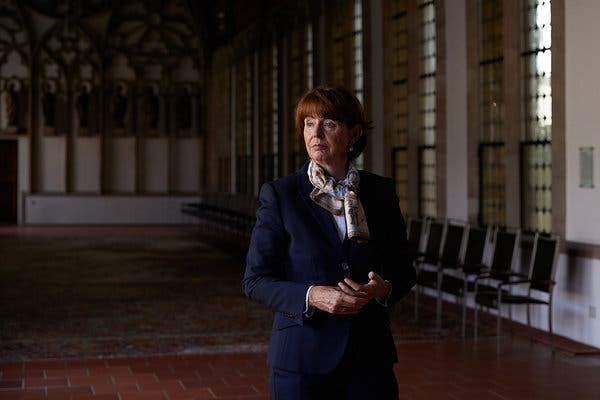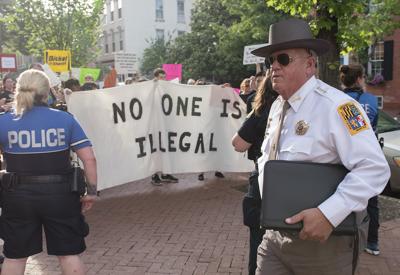
People await the firework show in front of the Lincoln Memorial on the National Mall in celebration of Independence Day in Washington, D.C. on July 4, 2018. Trump plans to speak in front of the memorial for the 2019 celebration. (Calla Kessler/The Washington Post)
President Trump plans to address the nation from the Lincoln Memorial on July 4 as part of an overhauled Independence Day celebration that would bring a host of new security and logistical challenges, D.C. officials and the U.S. Park Police said Wednesday.
The president had floated the idea of speaking at the nationally televised event, but his participation had not been confirmed. His appearance could reshape a decades-old, nonpartisan celebration that annually draws hundreds of thousands of visitors to the city’s monumental core.
U.S. Park Police spokesman Sgt. Eduardo Delgado confirmed that Trump plans to speak at the memorial. He said the agency was working with the White House to determine how the president’s movements would affect security surrounding the speech, and was awaiting details from the U.S. Secret Service about timing and duration of the speech.
“It’s still kind of an evolving event,” Delgado said.
National Park Service spokesman Mike Litterst declined to give details of the rebranded celebration, which Trump and White House officials are calling “A Salute to America.”
“The White House will make a statement,” Litterst said. “We continue to work with the White House on creating a Salute to America program that will bring Americans from all over the country together in [a] celebration of our great nation.”

Thousands of Americans celebrate and observe the Annual Fourth of July Fireworks on Independence Day on the National Mall in Washington, DC on July 04, 2018. (Marvin Joseph/The Washington Post)
A White House official could not immediately confirm the president’s plans.
[Trump takes over Fourth of July celebration]
D.C. Mayor Muriel E. Bowser (D) said the Park Service had informed the city that Trump would speak. She has previously said she opposes Trump’s efforts to take over the event and inject himself into the program, citing security, tone and logistics. The president, however, has made clear over the past two years his desire to stage a grand patriotic display in the nation’s capital.
He first announced his plans to speak July 4 in a February tweet promising one of the biggest gatherings in Washington history, with a “major fireworks display, entertainment and an address by your favorite President, me.”
The administration plans to move the fireworks display from the usual location on the Mall to West Potomac Park, and the event may feature a second entertainment stage in addition to the standard free concert on the West Lawn of the U.S. Capitol.
D.C. Del. Eleanor Holmes Norton (D), the city’s nonvoting representative in Congress, said the president’s address could change the tenor of what is traditionally a family-friendly event by drawing his detractors and hardcore supporters.
“It’s about the worst holiday he could have chosen,” Norton said. “You never want to make events like this around a single person. This is the difference between the Soviet Union — the old Soviet Union — and the United States. Cults of personality are not how we operate in this country.”
But while the Washington region is heavily Democratic, it is also home to thousands of Trump supporters who may be eager to see the president on Independence Day. The celebration also draws tourists from both blue and red states across the country.
“I think he’s doing a great job, and I’d love to have a front-row seat,” said Lori Saxton, a D.C. resident who administered a Facebook group for Trump supporters during the 2016 election. “I think he just wants to unite the nation, and he’s getting a very hard time doing it from the other side.”
City officials responsible for managing traffic and providing security said they have received few details from the federal government about Trump’s plans, with the holiday just four weeks away.
“We understand the federal government is moving forward . . . but we do not have details beyond that and urge the federal government to make that information public,” said LaToya Foster, a Bowser spokeswoman.
[‘HOLD THE DATE’: Trump announces July 4 plans via tweet]
Kim Dine, a former assistant D.C. police chief and a former chief of the U.S. Capitol Police, said the president’s changes to the celebration will complicate what had been a well-choreographed event. Depending on the timing of Trump’s address and restrictions that could be put in place, attendees may not be able to watch both the speech and the fireworks.
“Managing large crowds is doable but difficult,” Dine said. “And when you have the added challenge of VIP presence, or POTUS presence, and the massive amount of security that attends to him, that adds significantly to the whole equation.” (POTUS is an acronym for “President of the United States.”)
The last time law enforcement authorities made substantial changes to their July 4 security plan was after the 9/11 terrorist attacks. Those changes included screening spectators entering the Mall and introducing limited access points.
D.C. police spokesman Dustin Sternbeck said the basic underpinning of that plan remains unchanged. Police still will put out maps and visitor guidelines, including lists of prohibited items.
“We are in coordination with our federal partners preparing to plan and host a successful 2019 Independence Day,” Sternbeck said, adding that police do not plan anything “that is going to prevent anybody from enjoying the celebration.”
A spokesman for the Washington Metropolitan Area Transit Authority said the agency would modify its operating plans for trains and buses to accommodate the president’s speech.
“Plans are in development, and we have been coordinating with agencies that provide support for that event including DDOT, the U.S. Park Police and the Secret Service,” said Metro spokesman Dan Stessel. “We knew there was a possibility of the president speaking, and now that we know, we will modify those plans to support that.”
Public presidential appearances are rare in Washington for security reasons. No president has been part of a Fourth of July celebration on the Mall in recent memory.
President Ronald Reagan participated in a “Star Spangled Salute to America” at the Jefferson Memorial on July 3, 1987, the day before the holiday.
President Harry Truman delivered a speech from the Washington Monument on July 4, 1951 to celebrate the 175th anniversary of the signing of the Declaration of Independence, and President Abraham Lincoln delivered a belated “Fourth of July” speech from a second-floor window of the White House on July 7, 1863, according to the Park Service.
Trump backed away last year from his proposal to stage a military parade on Pennsylvania Avenue as concerns about expenses grew. The president claimed, without presenting evidence, that D.C. officials were inflating the costs.
In an interview last month, Bowser said she hoped the president would refrain from divisive rhetoric if he appeared on the Mall on July 4.
“The president can speak at any event that he wants to speak at,” Bowser said then. “And my great hope would be that he recognizes that the event is a unifying event that celebrates the birthday of our nation.”
Lori A. Aratani and Juliet Eilperin contributed to this report.
Read more:
D.C. felons would be able to vote from prison under proposed bill
Audit: Bowser administration awarded millions to lower-scoring developers
D.C. statehood to receive first U.S. House hearing in a quarter century
Local newsletters: Local headlines (8 a.m.) | Afternoon Buzz (4 p.m.)
Like PostLocal on Facebook | Follow @postlocal on Twitter | Latest local news


